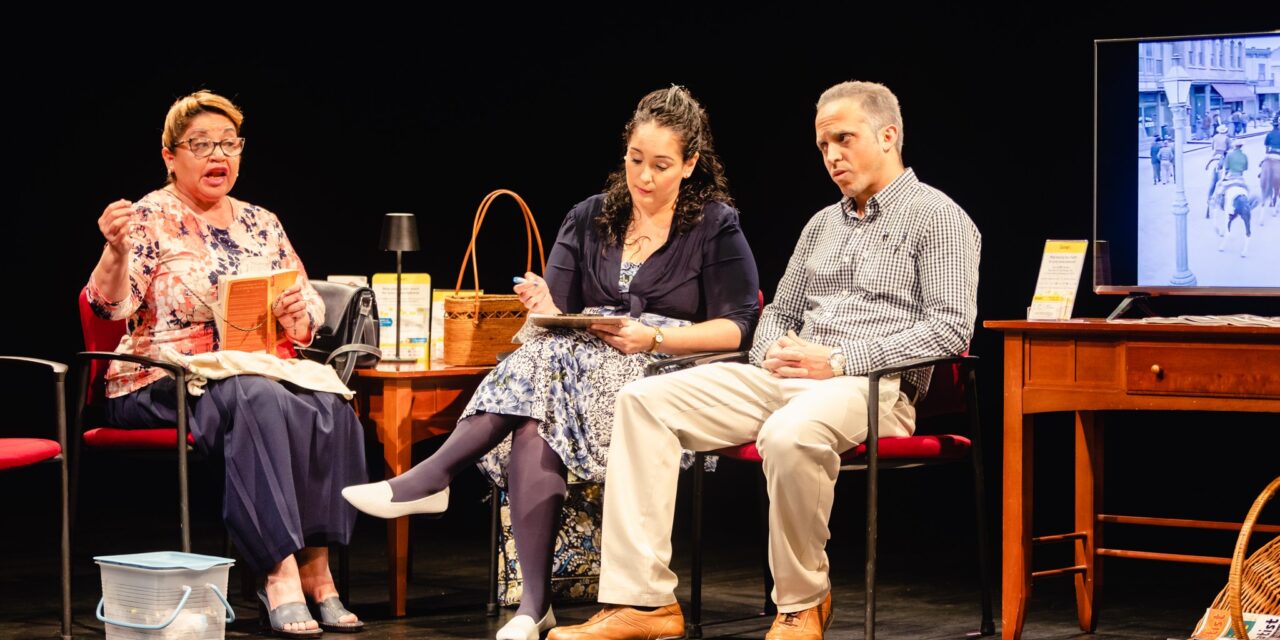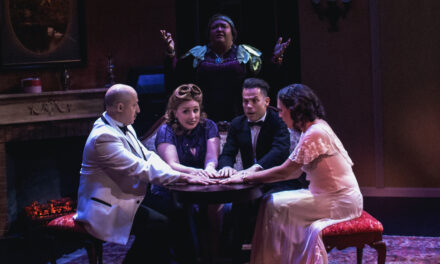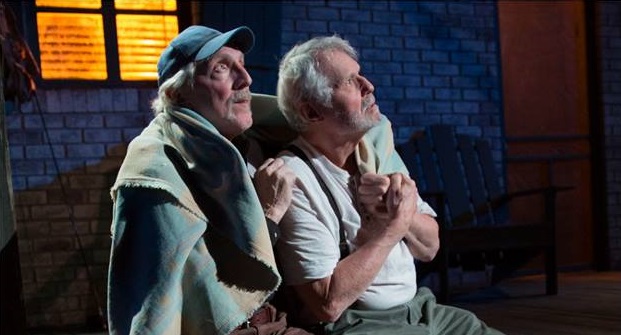Miraidis Aquilera, Jomaris DeJesus, & Orly Parrados in Peety. Photo: Julio Samayoa
Peety
Written & directed by Haydee Canovas
Review by/Revisado por Keith Waits in English/Espanol
Entire contents are copyright © 2023 by Keith Waits. All rights reserved.
Todo el contenido es copyright © 2023 por Keith Waits. Todos los derechos reservados.
A Cuban-American woman, Peety, comes to a Miami healthcare facility with her aging parents because her father, Alfredo, has been experiencing chest pains while mowing the lawn. Their experience perfectly characterizes the frustrations with the bureaucracy and lack of compassion for so much healthcare in the United States.
That’s the obvious political message, but as Peety fills out the admission forms and elicits medical history and a list of medications from Alfredo, the mundanity of the circumstance becomes an observation of intergenerational familial friction that many of the audience will find a common experience.
As a playwright, one of Haydee Canovas’ strengths is that type of observation, and usually, she has employed it in service to big, socially relevant themes such as immigration and sex trafficking. With Peety, she translates her own real-life experience into a spare, personal play lacking in such ambitions. Canovas, a nurse practitioner in her own career, is qualified to offer meaningful commentary on healthcare issues, and the topic is fertile territory, but here she limits herself to a small story about human impatience with waiting, especially when suffering.
Yet waiting is not inherently dramatic, and the three primary characters spend most of the play sitting in the same three chairs, so Peety is very static in its staging, and Canovas introduces an older man in a wheelchair (David Wade McCoy) toting a box of Dunkin’ Donuts donut holes and his gum-chewing niece (Jay Marie Padilla) to freshen up the action.
The audience remains engaged because of the easy comic interaction of Peety (Jomaris DeJesus), Alfredo (Orly Parrados), and Petra (Miraidis Aquilera). The light bickering feels authentic and the result more of eccentricity and that Peety has learned how to navigate the culture with more success. All three performances are well-judged and intimate, although Aquilera makes the most out of the brief comic interjections Canovas gives the character.
However heartfelt and personal to its author, Peety does not have her usual level of ambition and therefore lacks the impact of her best work. Where in other plays she uses small, personal experiences as an entry point into larger societal structures, here she stays focused on the intimate and ordinary exchange of family members, so that her only theme is just that, family. While the medical circumstance is not profoundly serious, the lack of melodrama feels exactly the point.
The simple but nifty set is by Holly Stone, and includes a television showing reruns of the classic TV western Bonanza in act one and after intermission, a Spanish-language female judge presides.
As a production from Louisville’s Spanish-language theatre company, the actors speal Spanish with supertitles projected for those of us who don’t. In this instance, I found the supertitles difficult to read mostly because of their proximity to the lighting in my sight line, but once I understood the dynamic and details of the situation, I could follow the emotional arc of the story well enough, I think. It’s difficult to know how much I might have missed, or misunderstood.
Featuring Miraidis Aquilera, Jomaris DeJesus, Orly Farrados, David Wade McCoy, Dave Medina, Xenia Miller, Jay Marie Padilla, & Isabel Villa
________________________________________________________________
Una mujer cubanoamericana, Peety, llega a un centro de salud de Miami con sus padres ancianos porque su padre, Alfredo, ha estado experimentando dolores en el pecho mientras cortaba el césped. Su experiencia caracteriza perfectamente las frustraciones con la burocracia y la falta de compasión por tanta atención médica en los Estados Unidos.
Ese es el mensaje político obvio, pero a medida que Peety completa los formularios de admisión y obtiene el historial médico y una lista de medicamentos de Alfredo, la mundanidad de la circunstancia se convierte en una observación de fricción familiar intergeneracional que muchos de los espectadores encontrarán una experiencia común.
Como dramaturga, uno de los puntos fuertes de Haydee Canovas es ese tipo de observación y, por lo general, la ha empleado al servicio de grandes temas socialmente relevantes, como la inmigración y el tráfico sexual. Con Peety, traduce su propia experiencia de la vida real en una obra de teatro personal y sobria que carece de tales ambiciones. Canovas, una enfermera practicante en su propia carrera, está calificada para ofrecer comentarios significativos sobre temas de salud, y el tema es un territorio fértil, pero aquí se limita a una pequeña historia sobre la impaciencia humana con la espera, especialmente cuando se sufre.
Sin embargo, la espera no es inherentemente dramática, y los tres personajes principales pasan la mayor parte de la obra sentados en las mismas tres sillas, por lo que Peety es muy estático en su puesta en escena, y Canovas presenta a un hombre mayor en silla de ruedas (Dave Medina) cargando una caja de Dunkin’ Donuts donuts y su sobrina masticadora de chicle (Jay Marie Padilla) para refrescar la acción.
La audiencia permanece comprometida gracias a la fácil interacción cómica de Peety (Jomaris DeJesus), Alfredo (Orly Parrados) y Petra (Miraidis Aquilera). Las disputas ligeras se sienten auténticas y el resultado más de la excentricidad y que Peety ha aprendido a navegar la cultura con más éxito. Las tres actuaciones están bien enjuiciadas y son íntimas, aunque Aquilera aprovecha al máximo las breves interjecciones cómicas que Canovas le da al personaje.
Por más sincera y personal que sea su autora, Peety no tiene su nivel habitual de ambición y, por lo tanto, carece del impacto de su mejor trabajo. Mientras que en otras obras usa pequeñas experiencias personales como punto de entrada a estructuras sociales más grandes, aquí se mantiene enfocada en el intercambio íntimo y ordinario de los miembros de la familia, de modo que su único tema es precisamente eso, la familia. Si bien la circunstancia médica no es profundamente grave, la falta de melodrama siente exactamente el punto.
El escenario simple pero ingenioso es de Holly Stone, e incluye una televisión que muestra reposiciones del clásico western televisivo Bonanza en el primer acto y después del intermedio, preside una jueza en español.
Como una producción de la compañía de teatro en español de Louisville, los actores hablan español con supertítulos proyectados para aquellos de nosotros que no lo hacemos. En este caso, los supertítulos me resultaron difíciles de leer principalmente debido a su proximidad a la iluminación en mi línea de visión, pero una vez que entendí la dinámica y los detalles de la situación, pude seguir el arco emocional de la historia bastante bien, creo. Es difícil saber cuánto me he perdido o entendido mal.
Presentado Miraidis Aquilera, Jomaris DeJesus, Orly Farrados, David Wade McCoy, Dave Medina, Xenia Miller, Jay Marie Padilla, & Isabel Villa
Peety
March 23, 24, 25, 30, 31, & April 1 @ 7:30 pm
March 26 @ 2:00 pm
Teatro Tercera Llamada
Kentucky Center
501 West Main Street
Louisville, KY 40204
502-584-7777
kentuckycenter.org
Keith Waits is a native of Louisville who works at Louisville Visual Art during the days, including being the host of LVA’s Artebella On The Radio on WXOX 97.1 FM / ARTxFM.com, but spends most of his evenings indulging his taste for theatre, music and visual arts. His work has appeared in Pure Uncut Candy, TheatreLouisville, and Louisville Mojo. He is now Managing Editor for Arts-Louisville.com.





